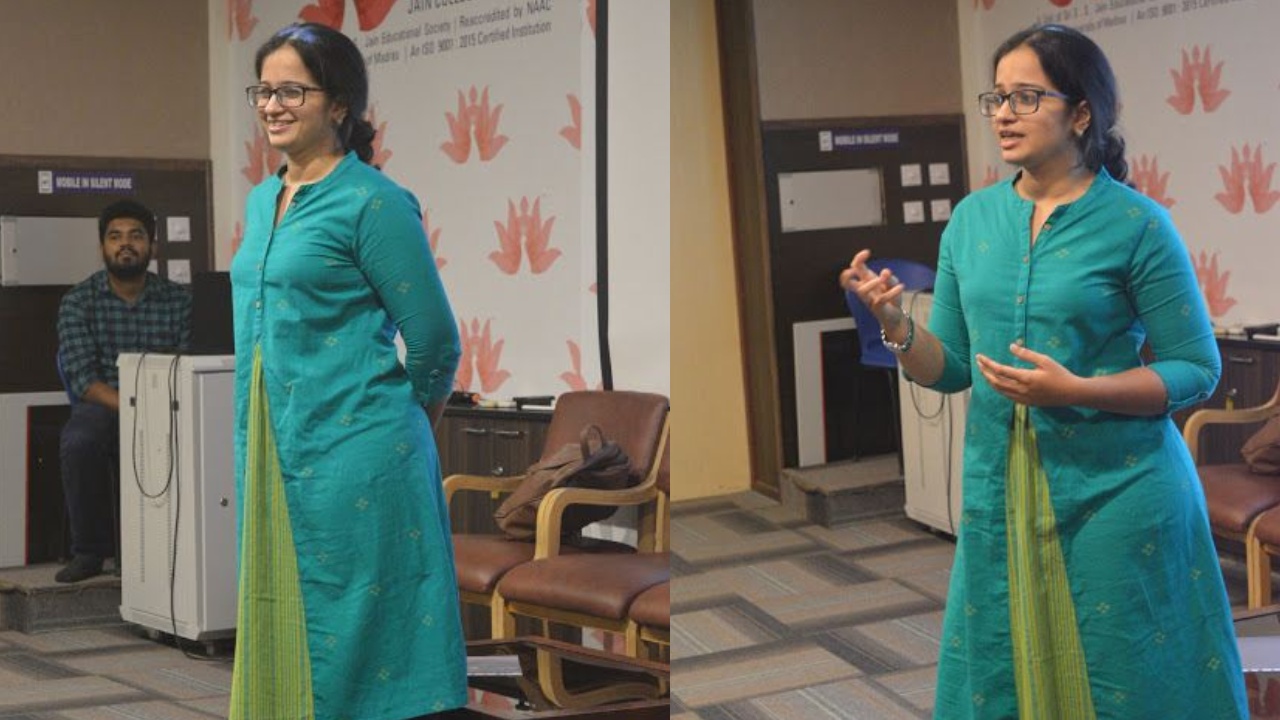This intriguing workshop on Film appreciation indulges importantly on the need to develop the respect towards the creators to get a non-judgmental closer look at their creations. It lays the path further to appreciate or criticize their works. Ashameera Aiyappan, the film reviewer from The New Indian Express, conducts this workshop, on last Saturday, Feb 29th, that’s brought to the aspirants by Clever Audience. It is an attempt to make the audience clever to the various forms of art they consume and this attempt certainly drives its point to home.
When I reached the hall where the event took place, the Shashun College in T. Nagar, I felt that this was going to be a solid meditative experience for the next 2 hours, not just because I was asked to remove my footwear as per their policy, but also it fostered a sense of amusement. I felt I had to regard this entire workshop with a contemplative eye. Clever Audience. by Santhosh Mathevan has initiated it and successfully pursued Ashameera to conduct this workshop. The aspiring film reviewers, the enthusiasts and the students and everyone there shared the vibe of pure joy within us. The joy, in learning new things, flared up the passion and made us realize that it was possible to learn. Clever Audience. has been conducting various workshops to give platform for the rising and aspiring artists.
Santhosh Mathevan begins the event with an introduction to the topic that this workshop was planning to dwell on. He gives a friendly introduction on why it is important to appreciate a film. It is indeed a sincere effort to bring in the thoughts for a discussion among the audience. He states the truth with utmost humility that Cinema is not just there for the purpose of entertainment or to kill a couple of hours of a day. Instead, Cinema documents the culture, the history and the tradition and is viewed as the testament of our livelihood. It is necessary to preserve them and to remember to appreciate them in order to look back at any point of time in life. Leaving the audience with that thought, he gives the stage to Ashameera to take it forward.
Ashameera Aiyappan, an amazing being, keeps the objective of this workshop perfectly clear, that it is going to be a fun-filled, interactive session and she delivers her promise. She is so humbled and she is loved for her scintillating wit. She raises a very important question that why Cinema has to be subjected to the usual norms and why it is demanded to satisfy the audience who pays to see it, when these conditions are not applied to any other art forms – say books, paintings. Just like any other art form, Perception differs from one person to another. A constructive criticism on an art work is always essential. It is a reviewer’s role to absorb and appreciate the metaphorical references of the directors and how they intends to stage them on screen. It is necessary to put spotlight on the brilliance and to welcome different perceptions. For that, Ashameera encourages the aspirants to develop the wit and knowledge on the basics of film making to recognize the designs and nuances on screens when they see it. She also adds that while the purpose of a film review is widely perceived as a way for the readers to decide whether they want to watch a film or not, A review acts as a bridge between the audiences and the filmmaker. A review sheds light on the brilliant parts of a film and the valuable/harmful ideology that mostly go unnoticed or overlooked by the common audiences. And it lets the filmmakers to realize their strength and mistakes to take away from the reviews.

Ashameeera also talks about the importance to notice how the craft of a film is arced, how it’s staged, how the film has used the blocking techniques, the music, the editing and the entire structure of a film. Noticing certain things in a film sets a trajectory to follow the characters’ development in it. At the end, to become an effective film reviewer, she says, one has to learn to express why you like a film if you like it and if not, then why you don’t like it. An honest, own perception is what matters. It adds value to the review when it spells out the nuances of the film. She declares writing review is also a form of art.
It is a fun-filled, interactive discussion on films and the need to appreciate/criticize films with social responsibility. She firmly believes that cinema is a powerful tool that can make a strong influence on its audiences. She astonishingly recalls Shubh Mangal Zyada Saavdhan (2020), the first mainstream rom-com on homosexual relationships in Bollywood, and says how the value or awareness about a matter is taken to the common man/woman on the street. Now, a street vendor knows what homophobia is. She also puts out the question how women are represented in today’s cinema, how toxicity is often glorified than being represented just as it is. She draws the comparison between Joker/Asuran regarding the representation of an anti-hero and how it doesn’t glorify the negativity. She also calls out the wrong representation of an autistic character in Deivathirumagal and lauded Peranbu for its surrealistic portrayals. Her yearning to see simple, realistic, empowering women characters on screens is evident from her regular Ms. Representation columns in Cinema Express. It truly is an attempt to be treasured.
Ashameera talks about how Cinema is a curated reality and that lets one to live a thousands of lives in one lifetime through the characters we see on screen. Reading a brilliant film review paves way for the readers to achieve certain emotional intelligence in their life. It is a way to experience a school of emotions that they don’t get to experience in actual reality. It is regarded right not to have spoilers in one’s review. For the budding writers, she advises to write every single day and to get into a disciplined routine as there is no other easy way to deal with the writing blocks. She insists that it takes a lot of effort to be emotionally available to all the films a reviewer see and meticulously pens down what he/she feels about them.
A quick interaction, with Ashameera, allowed me to get to know how humbled and energetic she was in person too. I got a chance to ask her what made her realize that she wanted to become a film reviewer and what challenges she faced in her journey.
So, Ashameera, Your work stands out in the crowd. You bring in the new perceptions and sheds light on the overlooked real, sincere intention of a filmmaker. How did you begin to do this?
It was an accident actually. I like to see and discuss films since my childhood but I never thought I would be reviewing films one day. It was my friend who was with The Indian Express at the time when I was in Mumbai, say 3 years before. My friend encouraged me to send in my piece on a film and I did. I was surprised that they liked it. And My journey started there.
What are the challenges you faced in your journey?
It took me a lot of time initially to hone my skills, to learn the basics in the field. I learned how to look at the craft of a film gradually and picked up the pace. It takes a lot of effort to get oneself disciplined. Reading and writing are the essential parts of the practice every day. And That’s about it.
The workshop was enlightening and thoroughly enjoyable. It covered the topics from the history of film reviewing, the various ways of staging scenes in films and the ways to make out the filmmaker’s intent behind those staging. It was an introductory workshop as the time didn’t permit to dwell more on the discussions. The enthusiasts among the audience demanded many more sessions to come, following this event.



